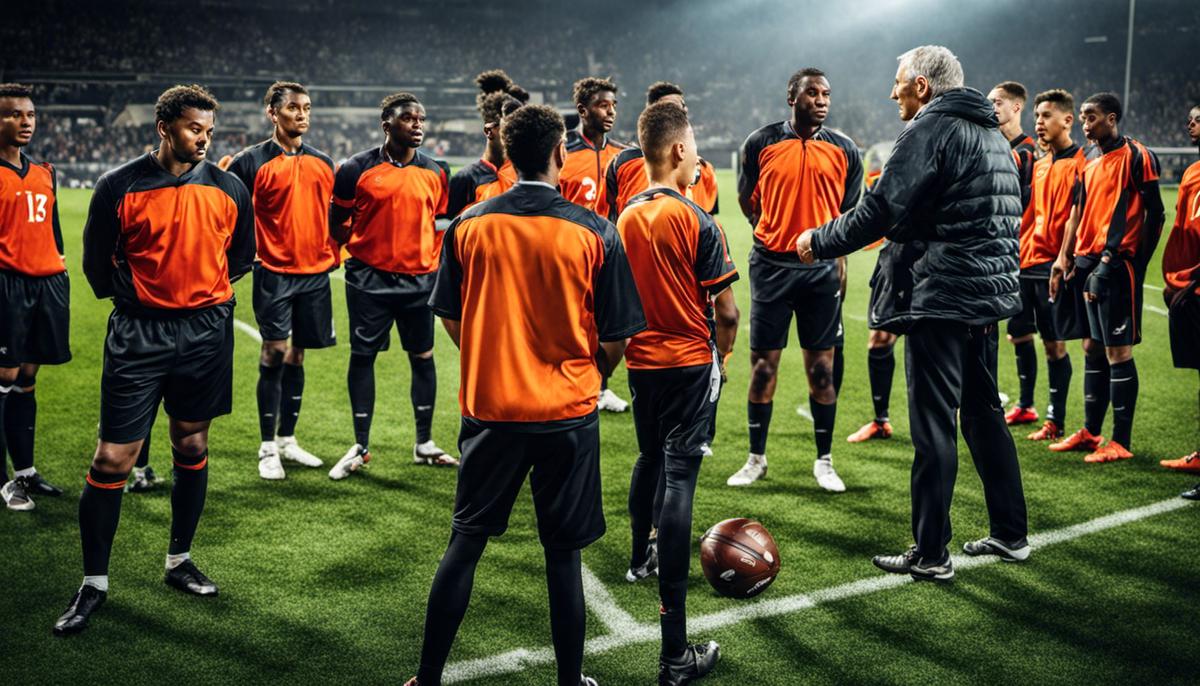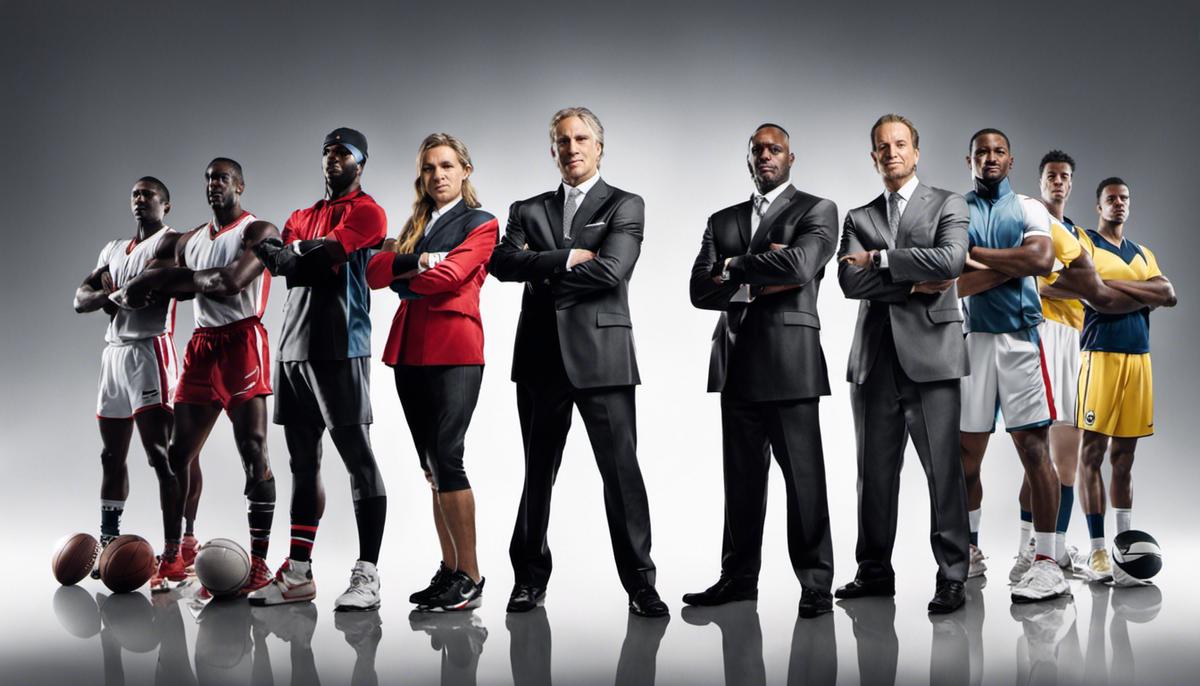Leadership, a fundamental aspect of success in any domain, holds a particular sway in the realm of sports. This can be attributed to the crucial role it plays in steering teams towards success, fostering individual talent and nurturing an atmosphere of competitive camaraderie. While the principles of leadership remain constant, the application of these principles in the field of sports exhibits unique nuances that are fascinating to delve into. Highlighting the skills, challenges, and influences within the sphere of sports leadership, this in-depth analysis aims to elevate understanding and promote insightful reflection for anyone hoping to excel in this area.
Understanding Leadership in Sports
Understanding Sports Leadership
Sports leadership refers to the combination of skills and behaviors that a person or a group exhibits to influence others within a sports context. These individuals inspire motivation, commitment and dedication, harnessing the unified strength of a team to achieve desired goals. Sports leaders, be it team captains, coaches, or managers, set the team’s direction, inspire them, instill discipline, and guide them towards achieving their full potential.
Unique Aspects of Leadership in Sports
Leadership in sports is distinct due to several reasons. Unlike in a typical corporate structure, the hierarchical boundaries in sports are often blurry, and roles can shift dynamically during gameplay. The intimacy of the environment; the pressures of competition; the necessity for split-second decision-making; and the public, often high-stakes, nature of the results all set sports leadership apart.
Characteristics of Effective Sports Leadership
The makeup of effective sports leadership revolves around several crucial traits. High on the list is the ability to communicate clearly and effectively. A great sports leader must establish an open line of communication where every team member feels heard and valued.
Motivation is a fundamental aspect of sports leadership. Inspiring team members to push themselves beyond their perceived limitations is necessary for continual growth and success in the sports world. A great sports leader must consistently motivate and inspire team members to achieve their personal best.
Also, decision-making, often under significant pressure, is another integral aspect of sports leadership. Decisions made by sports leaders can directly influence the outcome of a game, thereby impacting the entire team’s morale and confidence.
Leadership Styles in Sports
Sports leadership often requires a mix of leadership styles adapted to different situations and the team’s specific dynamics. The most common styles include autocratic, democratic, and transformational leadership. Autocratic leadership is characterized by the leader making all the decisions without input from team members, often effective in high-stress moments where quick decision-making is required. Democratic leadership involves engaging team members in decision-making and problem-solving, fostering a sense of involvement and ownership among team members. Transformational leadership inspires team members by setting high standards and fostering trust, largely promoting the team’s progress and personal development.
Challenges Facing Sports Leaders
Sports leaders face a unique set of challenges. Navigating the different personalities on a team, addressing the intense pressure to perform, dealing with public scrutiny, and managing egos are a few of these complexities. Managing these challenges requires adaptability, conflict resolution skills, and an ability to remain composed under pressure.
Impact of Effective Leadership in Sports
Effective sports leadership fosters team unity, cultivates dedication, promotes personal and collective growth, and ultimately influences a team’s performance. By developing a collaborative atmosphere where every team member feels valued and understood, sports leaders can harness the collective strength of a team to reach their goals.
The very essence of sports management is inexorably linked to developing and demonstrating dynamic leadership, which challenges one to inspire, direct, and lead their team towards victory. This development of leadership skills is an essential component in commanding respect and ensuring success in any sports setting.

Essential Skills and Traits of Sports Leaders
Qualities and Competencies for Stellar Sports Leadership
As an imperative trait, sports leaders must have strong communication abilities. The capability to articulate thoughts decisively, engage in active and receptive discussions, and keep dialogue lines open, cultivates trust and unity within the team. This strengthens team bonds, mitigates conflicts, and forges a common objective amongst team members.
Additionally, perseverance or resilience is a vital quality sports leaders need to build. As failures and setbacks are an intrinsic part of sports, a resilient leader can recover from these challenges, maintain optimism, and concentrate on concocting new strategies for growth. This resilience can then be passed down to their team, fostering a tenacious and determined environment.
Strategic thinking forms an integral part of effective sports leadership. Skilled leaders grasp the minute specifics of the game, foresee changes, and formulate relevant strategies. They calculate the team’s strengths and frailties and devise game plans that augment performance. This propensity to strategize, on both a large and small scale, is instrumental in ensuring team victory.
Motivational prowess is also indispensable for a sports leader. Leaders must consistently enthuse their teams, sustain optimism, and enhance team energy. This skill involves acknowledging individual contributions, fostering a supportive ambiance, setting ambitious yet feasible targets, and invigorating the team’s innate desire for triumph.
Last but not least, the ability to inspire serves as another pillar of sports leadership. Exceptional sports leaders have the capacity to electrify their teams, instilling a sense of mission, ambition, and passion. Their dedication, resolve, and zeal are contagious and frequently propel the team to surpass expectations.
Building and Fostering Skills for Sports Leadership
The journey towards becoming an exceptional sports leader revolves around mastery of critical skills, which fortunately can be cultivated and fine-tuned with time.
For instance, communication is pivotal to leadership and can be reinforced through avenues such as nonviolent communication sessions, ongoing feedback, and practicing active listening. This can be achieved through regular interaction with team members in various settings.
Another key trait, resilience, is built through embracing challenges, remaining adaptable, and learning from experiences. Techniques such as mental strength training, mindfulness, and psychology workshops can nurture this trait.
The ability to think strategically is honed by immersing oneself in the sport, analyzing successful strategies, and engaging in critical thinking. Learning from different coaching styles and understanding diverse gameplay can open doors to immense learning.
Motivational prowess can be developed by studying motivational theories, assessing team needs, and identifying innovative means to stimulate motivation. Attending motivation-focused workshops, observing successful sports leaders, and experimenting with unique methods can broaden one’s approach.
By embodying exceptional sporting ability, showing a high level of dedication, and setting a benchmark through personal performance, one can inspire others.
In conclusion, the route to incredible sports leadership could be arduous, but with perpetual learning, introspection, and refinement, it is certainly possible to rise as an effective and esteemed figure in the sports arena.

Influential Sports Leaders: Case Studies
Examining Leadership Styles of Prominent Sports Figures
The leadership approach adopted can greatly vary among successful sports figures, and these unique styles contribute significantly to their victories. Phil Jackson, celebrated for his time with the Chicago Bulls and Los Angeles Lakers, is famous for his calming, Zen-influenced style of leadership. Concentrating on mindfulness and unity rather than solely on winning formed the core of his leadership philosophy. This holistic approach helped the teams secure numerous championships under his guidance.
In stark contrast, Vince Lombardi of the Green Bay Packers embodied a more traditional, authoritative style of leadership. Disciplined and demanding, Lombardi valued rigorous work and complete commitment to the team above all. His noteworthy slogan, “Winning isn’t everything; it’s the only thing,” underscores his relentless pursuit of triumph. Despite his stringent methods, Lombardi’s leadership brought five NFL championships in seven years to his team.
Encountering and Overcoming Challenges in Sports Leadership
Sports leaders inevitably face unique challenges that test their leadership abilities. Legendary basketball coach Pat Summitt confronted such a challenge when she was diagnosed with Alzheimer’s disease in 2011 while still coaching the University of Tennessee women’s team. Showcasing incredible resolve and resilience, Summitt chose to continue coaching while educating others about her condition. Her transparency about her health and commitment to her role exemplified her strength as a leader.
Similarly, American football coach, Bill Belichick, has faced several challenges throughout his career as head coach of the New England Patriots, including scandal and high-profile player departures. Belichick is noted for his strategic genius and his ability to adapt to changing circumstances. His ‘Do Your Job’ mantra has demonstrated his focus on individual responsibility within a team context.
Innovation in Sports Leadership
Fresh and innovative approaches also mark successful sports leadership. Pep Guardiola, widely considered one of the best football managers in the world, is known for his innovative tactics that revolutionized football. This former manager of FC Barcelona and current manager of Manchester City transformed each of his teams through his innovative playing style, emphasizing retention of the ball, constant movement, and intense, high-pressing defense.
Jill Ellis, the former coach of the U.S. Women’s National Soccer Team, is also recognized for her innovative strategies and focus on player development, which led the team to consecutive World Cup victories in 2015 and 2019.
Understanding Sports Leadership
The scope of leadership in sports is vast and involves a blend of various styles and strategies. Successful leaders in sports, such as Phil Jackson’s Zen approach, Vince Lombardi’s authoritarian style, Pat Summitt’s determined resolve, or the innovation of Pep Guardiola and Jill Ellis, demonstrate the capability to tailor their methods according to changing conditions. It is these diverse yet effective strategies that guide their respective teams to success and provide invaluable lessons in sports leadership.

Challenges in Sports Leadership
Hurdles Faced by Sports Leaders
Being a leader in sports is akin to navigating an obstacle course with each challenge testing one’s leadership competencies. Coaches and sports managers often grapple with a unique set of challenges, some of which include handling team conflicts, dealing with the pressure of performance, and preserving team morale. These aspects present a constant test of their leadership skills and abilities.
Team Conflicts
Team conflicts can occur due to a variety of reasons like personality clashes, disagreements about goals, roles, and tasks, as well as issues involving ego or jealousy. These conflicts, if not addressed appropriately, can cause major disruptions to team dynamics, hamper output and lower the overall team spirit. Leaders have to adroitly manage these issues, ensuring fair treatment while making tough decisions, without letting it affect the harmony and cohesiveness of the team.
Performance Pressure
The pressure that comes with playing sports, particularly on a competitive level, is immense. Players, coaches, and managers all feel this pressure to perform and achieve results. For sports leaders, the challenge lies in managing their own stress levels while simultaneously helping their team cope with the pressure. The weight of expectations can lead to burnout, and hence leaders need to find effective ways to manage this.
Maintaining Team Morale
Maintaining team morale is another common challenge. Motivating the team constantly, especially in times of defeat or during a rough patch, can prove to be arduous. Losses can dent confidence and low morale can further aggravate the situation, leading to a sustained period of poor performance. It falls onto the sports leader to uplift morale and keep the team motivated towards achieving their goal.
Strategies to Overcome Challenges
These challenges, while complex, are not insurmountable. Sports leaders can deploy several strategies to address and overcome these issues effectively.
Resolving Team Conflicts
Open communication is key to resolving team conflicts. Encouraging team members to voice out their concerns and grievances can help in shedding light on underlying issues. Leaders can then facilitate a resolution process, fostering understanding and acceptance among team members. It is also important to set clear expectations about team behavior and communicate consequences of negative behavior.
Managing Performance Pressure
To manage performance pressure, sports leaders can focus on creating a supportive environment where mistakes are viewed as learning opportunities rather than failures. Encouraging athletes to focus on individual performance goals, rather than only the outcome, can help alleviate some of the pressure. Mindset training can also be used to manage stress and anxiety.
Uplifting Team Morale
For maintaining team morale, leaders should focus on fostering a positive and inclusive team culture. They must recognize and reward individual and team efforts, achievements, and improvements. In times of defeat, focusing on learnings and future strategies, rather than dwelling on the loss, can help lift spirits. Transparent communication and building strong relationships with each member are also crucial in keeping morale high.
Unquestionably, effective leadership plays a pivotal role in the attainment of success in sports. The trick lies in successfully forging through the labyrinth of challenges presented by team conflicts, high-stress situations, and morale-dipping episodes. However, with the adoption of pragmatic strategies and an approach laden with empathy, sports leaders have a high probability of surpassing these challenges and steering their teams towards victory.
The Impact of Effective Leadership in Sports
Quantifying the Impacts of Proficient Leadership in Sports
Undoubtedly, effective leadership forms the bedrock of any athletic endeavor, casting major influences on myriad outcomes such as enhanced team performance and heightened player satisfaction. A plethora of studies substantiate the fact that teams stewarded by adept leaders often showcase outstanding performance, a direct upshot of improved collaboration and heightened commitment from individual athletes. These impactful leaders pave the way, establish discipline, and guide athletes through trying circumstances, thus boosting overall team performance and success.
Leadership and Team Cohesion in Sports
Furthermore, research has posited a positive correlation between leadership and team cohesion. Leaders, especially coaches, have the ability to influence the cohesion of a team, creating an environment where players feel merged in pursuit of a common goal. By setting clear expectations and reinforcing a culture of mutual respect and cohesion, effective leaders can help foster a sense of belonging and unity among team members, which is critical for effective teamwork, thereby increasing the team’s odds of success.
Effective Leadership in Sports and Player Satisfaction
Player satisfaction in sports largely hinges on the quality of leadership. Effective leaders take the time to understand their players, identifying their strengths and weaknesses, and defining their roles accordingly. This demonstrated concern about each player’s personal performance often translates to improved satisfaction and motivation among athletes, encouraging them to give their best in competitions. Moreover, effective leaders ensure open communication, fairness in selection processes, and sound conflict resolution mechanisms, contributing to increased player satisfaction.
Leadership and Success in Sports
Leadership is intrinsically tied to overall success in sports. Effective leaders guide their teams to victories, championships and other accomplishments. They leverage their leadership skills to create a culture of resilience and relentless pursue victory. By setting strategic goals, imparting tactical knowledge, and constantly motivating the team, a good leader will be instrumental in steering the team towards achieving success.
Impact of Leadership on Personal Development of Athletes
Effective leadership in sports also impacts the personal development of athletes. Leaders are in a unique position to shape an athlete’s character, instill discipline, develop resilience and teach valuable life skills such as time management, teamwork, and problem-solving. Experienced leaders can serve as role models and impact athlete’s behaviors, habits, attitudes, and even their approach to sports and life in general.
Leadership Styles in Sports and their Impacts
Different leadership styles have varied impacts on sports outcomes. Transformational leaders inspire their teams towards achieving their best performance. By setting high expectations and supporting their athletes, these types of leaders foster an environment of motivation and commitment. Transactional leaders, on the other hand, rely on a system of rewards and punishments to drive performance. Each of these leadership styles has its strengths and has been proven effective in different sports settings.
These perspectives underline the significance of effective leadership in determining outcomes in sports. Whether it’s enhancing team performance, promoting cohesion, boosting player satisfaction, delivering overall success or shaping athlete’s personal development, it’s apparent that leadership plays a crucial role in sports.

Manifesting effective leadership in sports has profound implications on multiple facets including, but not limited to, improved team dynamics, augmented player satisfaction, and a marked increase in overall sports performance. Above and beyond these tangible outcomes, leadership contributes significantly to the personal growth of athletes, evoking resilience, discipline, and a spirit of never giving up. By recognizing the traits that define excellent sports leaders and diligently applying relevant strategies to surmount common challenges, it’s possible to unleash the powerful potential of teams and individuals alike. Keeping in mind these fascinating insights, one can appreciate the complexities and rewards of leadership in the vibrant world of sports.
